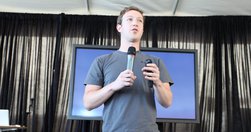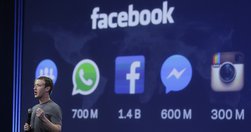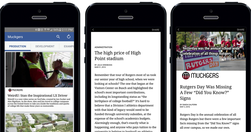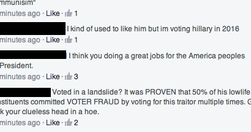Relevant Overviews
- Content Strategy
- Online Strategy
- Online Community Management
- Social Media Strategy
- Content Creation & Marketing
- Digital Transformation
- Surveillance Capitalism, Social media and Polarisation (Overview)
- Communications Tactics
- Psychology
- Social Web
- Media
- Politics
- Communications Strategy
- Science&Technology

News Feed Changes Mean Brands Should Invest in Facebook People More Than Pages... The News Feed algorithm is a lagging indicator, not a leading one. It now properly reflects what study after study shows the public truly values: relationships... No organization will ever be on the same footing as peers... Invest in Facebook people, more so than p…

Gawker built a tool that pulls in the top 10 comment threads from its network of sites and displays them at the end of its Facebook Instant Articles... [and] Accelerated Mobile Pages... It’s not possible to comment straight on the Instant Article; people who want to add to the discussion have to log in on Gawker’s own sites. Disqus supports Googl…

“I am actively searching through Facebook for people celebrating the Brexit leave victory,” ... to no avail. He called on his friends in the technology industry to act on this ‘echo-chamber problem’.... Why are they making the demand of social media companies — and not news organisations?...how we see technology now: both as something separate fro…
The Atlantic expects native campaigns to drive 70 percent of its ad revenue this year, up from 60 percent in 2015... the NYTimes’ branded content division, T Brand Studio, now includes 70 staffers and will “deliver more than $50 million in revenue this year,” up from an estimated $35 million in 2014

When people watch a live video after the fact, the engagement graph provides a valuable signal that can help people explore the video and easily identify highlights that they may find engaging...the engagement graph could push broadcasters to pepper their streams with moments of delight...
This isn’t the first time I’ve covered the impact of social media on news; technologies like augmented reality; and the impact of both on society. It is the first time these Top3ics have meshed so perfectly in one month.

Do we want Facebook to act as a news site? It certainly never started out that way... it actively didn’t want to be impartial — it wanted to be personalized.... Facebook doesn’t care one way or the other, as long as people see what they want. Yet we, as users, made Facebook into a news source...Facebook turned to curation, fueled in part by humans…

To demonstrate how reality may differ for different Facebook users, The Wall Street Journal created two feeds, one “blue” and the other “red.” If a source appears in the red feed, a majority of the articles shared from the source were classified as “very conservatively aligned” in a large 2015 Facebook study. For the blue feed, a majority of each …

There is no such thing as neutrality when it comes to media. That has long been a fiction... It’s also dangerous to assume that the “solution” is to make sure that “both” sides of an argument are heard equally... It is even more dangerous, however, to think that relying more on algorithms will remove this bias.Recognizing bias and enabling process…

Here is an overview of how Trending Topics works:

Instead of trying to bludgeon online companies to conform to some opaque standard of objectivity, we need to shift towards more fruitful endeavors... none of the outlets mentioned by name... are particularly well known news institutions... the underlying bias might not be based on institutional outlook, but an internal pressure to cite sources wit…

A year ago today, Facebook introduced Instant Articles... people are 20 percent more likely to read Instant Articles, which are accompanied by a lighting bolt icon in the feed, and 30 percent more likely to share them with friends...70 percent less likely to bounce... 30 percent more likely to share ...tests with some publishers where we help them…

Facebook’s reputation for neutrality took a major hit...not all of the examples cited by the employee indicate journalistic malpractice. Curators were told to not “trend” a story if only Newsmax or Breitbart... reported it. This is just good editorial guidance: Breitbart and Newsmax have a reputation for playing fast and loose with xenophobia and …

"trending” section of Facebook... functions sort of like the front page of a newspaper...The difference comes down to a distinction in how newspapers and Facebook judge what’s important to their readers...Facebook is playing editor all the time—it’s just that we don’t recognize it, because the editorial influence takes a different form than it wou…

Leaked internal guidelines show human intervention at almost every stage of its news operation, akin to a traditional media organization... This week the company was accused of an editorial bias against conservative news organizations... much of its news gathering is determined by machines... But the company relies on a small editorial team to det…

The filter bubble... has evolved. Algorithms, network effects, and zero-cost publishing are enabling crackpot theories to go viral... impacting the decisions of policy makers and shaping public opinion, whether they are verified or not... Facebook's news feed ... tailored just to us ... to keep us interested and happy... drives engagement and mor…
Ironically, with the widening of (national) news choices that the Internet has spawned, we’re depending on fewer pipelines of news. It’s a narrowing of the filter funnel...t as troubling as the filter bubbles that used to occupy our concerns, but likely more potent. As those pipelines narrow, necessarily, the decision on what is news, and what is …

Newspapers, magazines and other publishers are "feeding on the scraps" of Facebook's multibillion-dollar ad business despite playing a central role in keeping the social network's users happy... "They keep the $16bn to $18bn they get in the news feed... with personal sharing down, is ... effectively just an aggregation of premium publishers' cont…

Facebook is not a friend of journalism.. Yes, Instant Articles are sexy and monetisable... a hugely important route to readers, but the more dependent we get on them, the more they’ll be able to charge us to access that audience... Facebook is seeing an alarming (to them) drop in sharing of personal information...we’ll see Facebook start to turn d…

Advertising revenue grew by more than 50 percent since 2015, the company was hard at work on a future for artificial intelligence and virtual reality, and the average Facebook user is spending 50 minutes per day on Facebook, Instagram and Messenger.... more time than people spend reading ... sports ... or social events... Politics is downstream f…

Media companies are ‘broadcasting’ pre-recorded clips use the social network’s new feature... does not recommend streaming pre-recorded content... a strength of the feature is the ability for on-camera hosts to interact with viewers in real time... After they are streamed, Facebook Live videos function as normal Facebook videos.

we’ll guide you through the ins and outs of Facebook’s publishing platform and how to get started.

I’m going through the motions of converting my old digital news startup, Muckgers, into a Facebook-first publication.. Theoretically, all you have to do is install a plugin, insert a few lines of code into the HTML of your website, connect your RSS feed to your publication’s Facebook page, submit 10 sample Instant Articles for review and, pending …

Facebook says it’s not worried about the level of sharing from everyday users ... concerns that people are starting to use Facebook more like they use Twitter — passively consuming content instead of creating new material... a report from The Information said there has been a 20 percent decline in “original” content from users in the past year.

Study shows political discussions are ruining Facebook and friendships... users who try to talk about politics on Facebook are often surprised by the political opinions of their acquaintances... a diverse set of opinions among a user's friends makes everyone want to speak up less...Facebook has a low threshold for “friending” ... can bridge togeth…

Facebook introduced new APIs for messaging through Facebook Messenger. ... bots are legitimately cool and promise to revolutionize how we interact with services. And it’s a piece of cake to get one up and running.

Very few ... are capable of regularly creating compelling videos ... as social platforms look to saturate their feeds with video... they’re essentially competing for the same limited set of good videos. So those who create the quality stuff can demand payment. In recent weeks, those payments have begun flowing. For Facebook... people are simpl…
gadget “blog,” Circuit Breaker, that will live primarily as a Facebook page, with posts appearing in the Instant Articles format... the best of old-school blogging together with a sophisticated, aggressive modern platform distribution strategy... It’s not (yet) possible to be an Instant Articles publisher if you don’t have a web source from which…

SOMETHING REALLY DRAMATIC is happening to our media landscape, the public sphere, and our journalism ... without the level of public examination and debate it deserves. news publishers have lost control over distribution... increase in power of social media companies... a far greater concentration of power ... Networks favor economies of scale,…
Relevant Overviews
- Content Strategy
- Online Strategy
- Online Community Management
- Social Media Strategy
- Content Creation & Marketing
- Digital Transformation
- Surveillance Capitalism, Social media and Polarisation (Overview)
- Communications Tactics
- Psychology
- Social Web
- Media
- Politics
- Communications Strategy
- Science&Technology